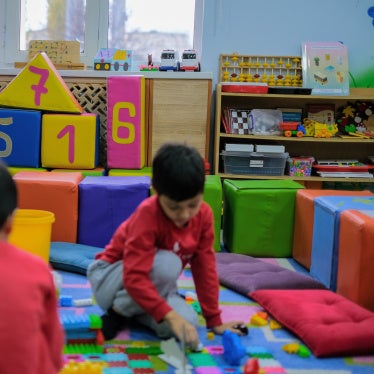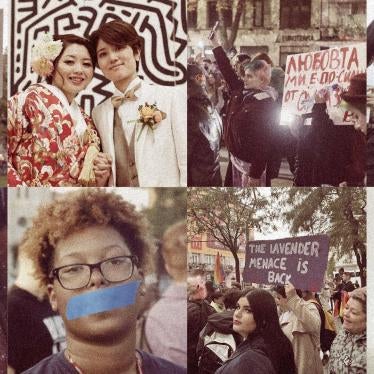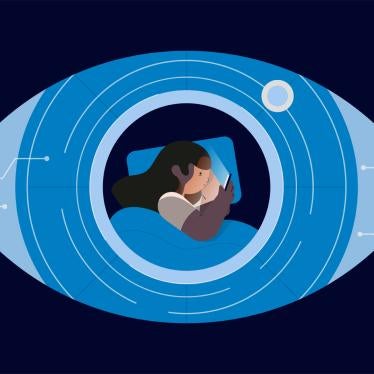Widney Brown, Human Rights Watch
"21st Century Slavery - The Human Rights Dimension to Trafficking in Human Beings" Conference in Rome, Italy on May 15-16
Good Morning
I would like to thank the organizers of the conference for inviting me to speak and for acknowledging the importance of working with victims of trafficking to ensure their rehabilitation and reintegration into society.
For too many years, trafficking in persons was seen solely as a criminal justice issue and, absent particularly compelling circumstances, was treated as a "victimless" crime. Over the last several years as an increasing number of cases of trafficking in human beings has come to light and as human rights activists around the globe have organized to address this human rights abuse, our understanding of trafficking has grown.
It has become increasingly obvious to those of us who work on trafficking that the only way to successfully end trafficking is for states to hold abusers accountable and to remedy the underlying human rights abuses that created the conditions for trafficking.
Much has been said about the root causes of trafficking; poverty, discrimination -- particularly against women, children and minorities -- , violence, and general insecurity often related to armed conflict. These are significant human rights violations that explain, in part, why human beings end up at the mercy of traffickers who trap victims in debt bondage and slavery like conditions.
And, much has been said about the human rights abuses victims of trafficking face when trafficked. Yet, despite this apparent sympathy for trafficking victims, states have been quick to distinguish between so-called "innocent" victims of trafficking and victims who states effectively blame and punish.
Part of the problem is that any victim of cross border trafficking will not have valid immigration papers. Just as an increasing number of states now penalize asylum seekers for irregular entry into a country of refuge, so too are many victims of trafficking punished as "illegal migrants." Additionally, when the form of forced labor into which the person is trafficked is illegal, some states treat the victim of trafficking as a criminal.
The Universal Declaration of Human Rights has as its foundation the simple but powerful idea that "all persons are born free and equal in dignity and rights." This concept demands that states treat people and promote their rights with the understanding that equality, or nondiscrimination, is critical to the promotion of the human rights of all people. One of the most important steps that states must take in ensuring the rehabilitation of trafficked victims is to end the practice of ranking and privileging some victims over others, for example, the so-called "innocent" victims v. so-called 'irresponsible" or "guilty" victim.
But this is not just about perceptions and judgments by states about which victims are innocents and which are guilty. It is also about recognizing some forms of trafficking while denying the harms done in other forms. For example, in the U.S. it was a battle to get the domestic legislation on trafficking to include all victims, not just those trafficked into forced sex work. And this is an important point, while government delegates legitimately talk of the horrors of sexual violence against trafficking victims who end up in sexual slavery, they ignore the sexual violence and abuse that is rampant among victims forced into other forms of forced labor.
If you talk with women and children who work in sweatshops, in domestic servitude, etc. - you will hear the stories of physical and sexual abuse - because at its core, trafficking is about the process of reducing human beings to property - fungible property at that. And, an indication of ownership in most cultures is the owner's right to absolutely control the property, even destroy it.
Once we understand trafficking and the harm done - it is easy to understand what action states must take to rehabilitate victims and work toward their successful reintegration into society. Any program must first and foremost return control to the victims. It is only when we have created the space for the trafficking victim to see her or himself again as a person, not an object, whose agency we respect and whose value is inherent, that she or he becomes a survivor.
Sometimes, in a rush to accomplish other goals, such as prosecuting the traffickers, states focus on victims for the information they can provide or their usefulness to the criminal justice system. The danger is that states treat the victims as merely a pawn in a struggle between the state and the trafficker not as a human being in need of services and deserving of respect.
I could go into detail about the need for housing and other basic necessities, the importance of counseling, medical care, legal advice, access to job training programs and education. But, realistically, the challenge for states is not identifying the services that victims of trafficking need to survive and grow. The challenge that we face is in getting states to see and respect, at the most basic level, the humanity of all victims and to get states to work with victims/survivor in a way that demonstrates their commitment to the protecting the equality and dignity of all human beings.
We must speak up when some victims of trafficking are dismissed as undeserving of rights and respect. We must protest when states refuse to recognize all forms of trafficking in human beings. And, of course, we must reject the practice of criminalizing victims of trafficking and placing their lives at risk through summary deportations or their psychological well being at risk though detention or imprisonment.
Thank you.







